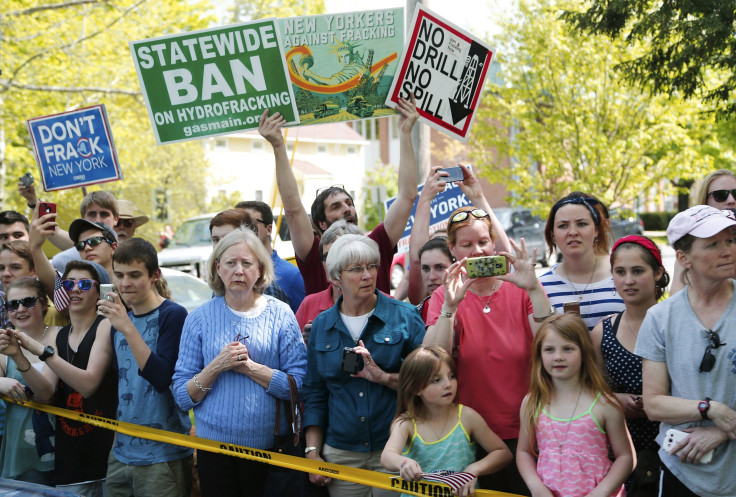Fracking Ruling In New York May Curtail Some Drilling In Other States

New York state’s highest court ruled Monday that towns and cities can ban fracking, a decision closely watched by the energy industry as local governments across the U.S. are considering using zoning laws to stop oil and gas drilling.
New York has a statewide moratorium on fracking for the state to study its impacts, but the ruling may further discourage oil and gas companies from investing in New York and encourage other states’ local governments to push for fracking bans.
“This sends a really strong and clear message to the gas companies who have tried to buy their way into the state that these community concerns have to be addressed,” Katherine Nadeau, policy director for Environmental Advocates of New York, an anti-fracking group, told Bloomberg. “This will empower more communities nationwide.”
The ruling "just means we as an industry need to work harder to educate communities about the truth and the benefits of this fracking boom that is driving our economic recovery and bringing America energy security,” Chris Faulkner, CEO of Breitling Energy Corporation, said.
Pennsylvania, which shares the underground Marcellus Shale natural gas resources with New York, West Virginia and Ohio, passed a similar ruling last year after trying to prohibit local governments from banning fracking but losing in court.
In the past 11 years, fracking technology has powered a boom in gas extraction from the Marcellus Shale. Though fracking has been around for many decades, the drilling practice is newer to the region than other areas of the country like the Barnett Shale of Texas, where modern fracking technologies were developed. In 2007, the shale play had only 27 wells, but by 2010, that number rose to 1,386, according to Geology.com.
Natural gas production from the Marcellus is expected to grow 36 percent by 2035 as drilling technologies continue improving, according to ICF International in its latest quarterly report.
Three cities in West Virginia tried to ban fracking within their jurisdictions in 2011, but state courts quickly ruled that the state’s authority to regulate drilling and fracking trumps local authorities. Since natural resources don't align with town borders, just one town's quickly-imposed ban can render drilling plans for a large area economically unfeasible, potentially impacting statewide business in a big way.
Another attempt to ban fracking within city limits happened in Ohio, when Beck Energy Corp. began drilling on private properties in Munroe Falls in 2011 with a permit from the Ohio Department of Natural Resources. The city filed a lawsuit, joined by another half-dozen communities.
Ohio’s legislature gave the state’s natural resources department sole authority in 2004 to regulate permitting, location and spacing oil and gas wells, but that law could be overturned soon. The case has reached Ohio’s Supreme Court, whose decision (to be announced soon at an unspecified date) will determine what authority if any Ohio cities have over oil and gas drilling and whether they can ban fracking.
Local fracking bans could extend beyond the Marcellus to California and Texas as well.
Cities and counties in California already have legal authority to temporarily or permanently ban oil and gas development, including bans on fracking, within their borders. A bill that would have halted fracking statewide while the state studies its impacts on health and groundwater during a severe drought barely failed in the California Senate in late May, but regional bans are popping up and passing across the state, including in Los Angeles, Beverly Hills and Santa Cruz.
In North Texas, fracking opponents in Denton have petitioned the city council to pass a law that would make the city the first in Texas to ban fracking. If the Council doesn’t pass the ban, voters may pass it in November.
According to Andrew Weissman, senior energy advisor for Haynes and Boone LLP, major oil-producing Texas wouldn't likely follow New York's lead.
New York's ruling is "likely to encourage similar efforts in other states but not likely to be successful in states in which, unlike New York, significant development is occurring," he said.
"The drilling simply goes elsewhere," Tom Gellrich, oil and gas analyst at Topline Analytics, added.
© Copyright IBTimes 2024. All rights reserved.












